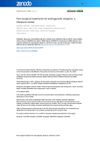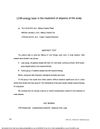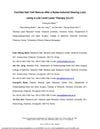 June 2023 in “Zenodo (CERN European Organization for Nuclear Research)”
June 2023 in “Zenodo (CERN European Organization for Nuclear Research)” Different non-surgical treatments like minoxidil, microneedling, and laser therapy can slow down and even reverse common hair loss, but each has its own limitations.
 June 2001 in “Proceedings of SPIE”
June 2001 in “Proceedings of SPIE” Low energy laser therapy effectively treats certain skin conditions and improves recovery time without side effects.
 December 1997 in “Proceedings of SPIE, the International Society for Optical Engineering/Proceedings of SPIE”
December 1997 in “Proceedings of SPIE, the International Society for Optical Engineering/Proceedings of SPIE” Low-energy laser therapy can improve scalp alopecia treatment when combined with classical methods.
 46 citations,
October 2012 in “Dermatologic Clinics”
46 citations,
October 2012 in “Dermatologic Clinics” Female pattern hair loss diagnosed by scalp appearance, treated with combined therapies and targeted approaches.
 June 2011 in “CRC Press eBooks”
June 2011 in “CRC Press eBooks” Low-Level Laser Therapy can stimulate healing and cell function, potentially leading to wider medical use.
 60 citations,
December 2015 in “Lasers in Medical Science”
60 citations,
December 2015 in “Lasers in Medical Science” Low-level laser therapy is safe and can increase hair growth for male and female pattern hair loss.
 6 citations,
October 2018 in “Lasers in Medical Science”
6 citations,
October 2018 in “Lasers in Medical Science” Low-level laser therapy using near-infrared light may help heart conditions and promote healing by releasing nitric oxide.
 January 2024 in “Photodiagnosis and Photodynamic Therapy”
January 2024 in “Photodiagnosis and Photodynamic Therapy” Using minoxidil with laser therapy is more effective for female hair loss than minoxidil alone.

Low Level Laser Therapy may improve noise-induced hearing loss.
 32 citations,
September 2016 in “Dermatologic Surgery”
32 citations,
September 2016 in “Dermatologic Surgery” The evidence for using Low-Level Laser Therapy for hair loss is limited and more thorough research is needed.
 2 citations,
January 2007 in “Journal of The American Academy of Dermatology”
2 citations,
January 2007 in “Journal of The American Academy of Dermatology” Red and infrared light therapy improves hair growth in balding patients.
 81 citations,
July 2011 in “Lasers in Medical Science”
81 citations,
July 2011 in “Lasers in Medical Science” The Lexington LaserComb helped regrow hair in mice with a condition similar to human hair loss.
 February 2024 in “Actas Dermo-Sifiliográficas”
February 2024 in “Actas Dermo-Sifiliográficas” Dermatologists recommend oral dutasteride for male hair loss, low-dose oral minoxidil for female hair loss, and a multidisciplinary approach for young patients, with caution during pregnancy.
 54 citations,
May 2018 in “Journal of The European Academy of Dermatology and Venereology”
54 citations,
May 2018 in “Journal of The European Academy of Dermatology and Venereology” Low level laser therapy works best for hair loss, followed by PRP, finasteride, and minoxidil.
 1 citations,
February 2010 in “Proceedings of SPIE”
1 citations,
February 2010 in “Proceedings of SPIE” Low level laser therapy may help regenerate hair cells in the ear after damage from gentamicin.
 1057 citations,
November 2011 in “Annals of Biomedical Engineering”
1057 citations,
November 2011 in “Annals of Biomedical Engineering” Low-level Laser Therapy may help reduce inflammation, pain, and aid healing, but more research is needed to confirm its effectiveness and establish standard treatment guidelines.
 33 citations,
March 2017 in “Dermatologic Surgery”
33 citations,
March 2017 in “Dermatologic Surgery” Low-level laser therapy effectively treats female hair loss, increasing hair count by 51%.
 28 citations,
December 2017 in “Lasers in Medical Science”
28 citations,
December 2017 in “Lasers in Medical Science” Monochromatic light devices, especially the 308-nm excimer laser, are promising for treating alopecia areata but more research is needed.
 February 2016 in “Aktuelle Dermatologie”
February 2016 in “Aktuelle Dermatologie” Low-Level Laser Therapy significantly improves hair density in women with hormonally and age-related hair loss.
 41 citations,
December 2017 in “Lasers in Medical Science”
41 citations,
December 2017 in “Lasers in Medical Science” Low-Level Laser Therapy (LLLT) is a safe and effective treatment for common hair loss, but more research is needed to find the best power and wavelength for treatment.
 53 citations,
February 2020 in “Expert Opinion on Pharmacotherapy”
53 citations,
February 2020 in “Expert Opinion on Pharmacotherapy” Finasteride and minoxidil work best together for hair loss.
 11 citations,
January 2020 in “Skin appendage disorders”
11 citations,
January 2020 in “Skin appendage disorders” Low-level laser therapy safely and effectively improves hair growth and coverage for male and female pattern hair loss.
April 2022 in “International Journal of Health Sciences (IJHS)” Combining laser therapy with platelet-rich plasma improves hair growth in people with hair loss.
 January 2018 in “Springer eBooks”
January 2018 in “Springer eBooks” Lasers are less favored for hair transplant surgery but show promise for hair growth in controlled trials.
 33 citations,
January 2021 in “Aesthetic Surgery Journal”
33 citations,
January 2021 in “Aesthetic Surgery Journal” Low-Level Light Therapy (LLLT) is a safe and effective method for skin rejuvenation, acne treatment, wound healing, body contouring, and hair growth, but more well-designed trials are needed for confirmation.
 31 citations,
June 2018 in “Dermatologic Surgery”
31 citations,
June 2018 in “Dermatologic Surgery” Low-level light therapy safely improves hair coverage, thickness, and count in androgenetic alopecia patients.
 4 citations,
February 2014 in “Proceedings of SPIE”
4 citations,
February 2014 in “Proceedings of SPIE” Low-Level Light Therapy is effective for skin rejuvenation, wound healing, and hair growth, with mild side effects.
 147 citations,
January 2014 in “American Journal of Clinical Dermatology”
147 citations,
January 2014 in “American Journal of Clinical Dermatology” Laser device increases hair density, safe for treating hair loss in men and women.
 1 citations,
May 2017 in “InTech eBooks”
1 citations,
May 2017 in “InTech eBooks” Some cosmetic procedures show promise for treating hair loss, but more research is needed to confirm their safety and effectiveness.
 26 citations,
May 2017 in “Lasers in Medical Science”
26 citations,
May 2017 in “Lasers in Medical Science” Laser therapy and hair growth factors significantly improve hair density in male baldness.





























